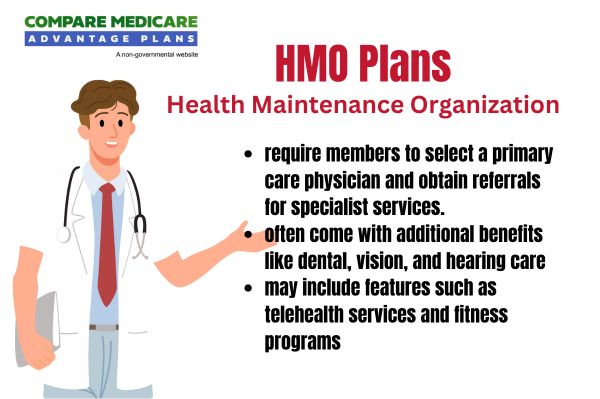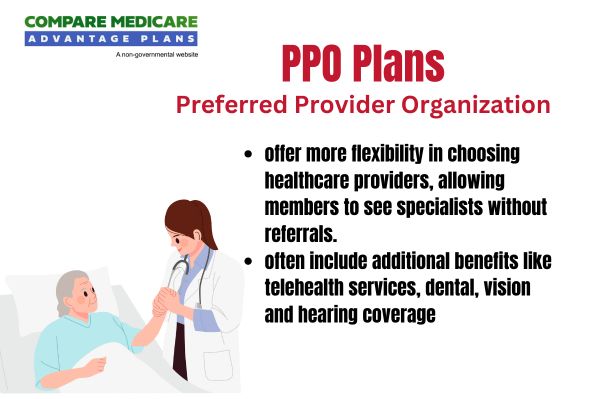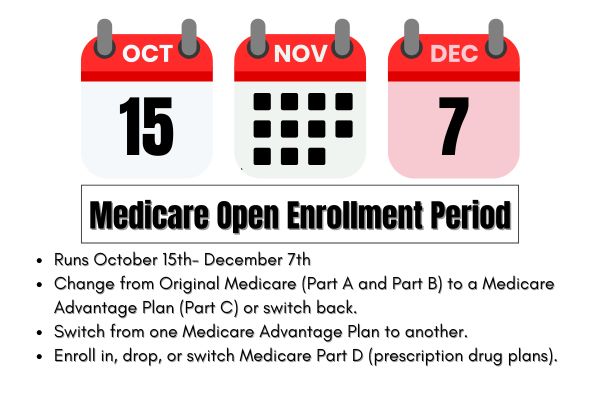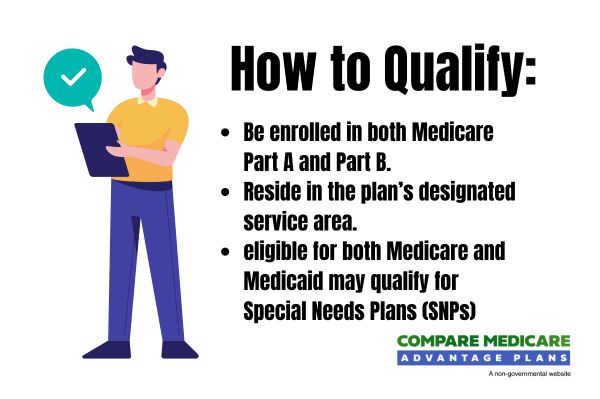Medicare Advantage Plans Massachusetts 2026
Are you looking for the best Medicare Advantage plans in Massachusetts for 2026? This guide will help you navigate the available plan types, potential benefits, and possible costs. Whether you’re already enrolled or considering switching, this article will cover everything you need to know about the Medicare Advantage Plan in Massachusetts, ensuring you make an informed decision.
Key Takeaways
- Some Massachusetts Medicare Advantage Plans may offer additional benefits that may go beyond traditional Medicare, which may include vision, dental, and hearing programs, possibly enhancing overall healthcare coverage.
- Massachusetts will likely provide various plan types, including HMO, PPO, and Special Needs Plans, allowing beneficiaries to choose plans that fit their healthcare needs and preferences.
- Enrollment in Medicare Advantage Plans requires eligibility for Medicare Part A and Part B, and understanding the different enrollment periods is crucial for beneficiaries to select suitable plans.
Compare Plans in One Step!
Enter Zip Code
Understanding Massachusetts Medicare Advantage Plans

Massachusetts Medicare Advantage Plans could potentially offer an alternative to traditional Medicare. These plans, also known as MA plans, are managed by private insurance companies and some might include additional coverage for services like vision, dental, and hearing, which are not offered with Original Medicare. These potential benefits could make these plan an attractive option for beneficiaries looking to enhance their healthcare coverage.
Enrollment in a Massachusetts Medicare Advantage Plan requires eligibility for Medicare Part A and Part B. While these plans must adhere to Medicare’s guidelines, some may also provide additional benefits, such as vision, dental, hearing, and prescription drug coverage.
Based on data from recent years, there were over 110 Medicare Advantage plans available in Massachusetts. This variety likely ensures that residents could find a plan that fits their specific healthcare needs and financial situation.
Types of Massachusetts Medicare Advantage Plans Available
Massachusetts offers various types of Medicare Advantage plans, each tailored to meet different healthcare needs. These plans can be broadly categorized into Health Maintenance Organization (HMO) plans, Preferred Provider Organization (PPO) plans, and Special Needs Plans (SNPs).
Each type has its own set of features and benefits, likely allowing Medicare beneficiaries to choose the plan that best suits their healthcare requirements and lifestyle.
HMO Plans

HMO plans in Massachusetts typically require members to choose a primary care physician who coordinates all their healthcare services. This means that for most specialist visits, a referral from the primary care physician is necessary.
One of the potential advantages of HMO plans might be the lower out-of-pocket costs compared to other plan types. However, members must use a network of doctors and hospitals, and services received outside this network might incur higher costs.
These various benefits could potentially enhance the overall healthcare experience, likely making HMO plans a popular choice among Medicare beneficiaries in Massachusetts.
PPO Plans

PPO plans in Massachusetts provide more flexibility compared to HMO plans. Members can see any doctor without a referral, though using in-network providers costs less. This flexibility could be particularly beneficial for those who prefer to manage their healthcare independently and want the freedom to choose their specialists without needing prior authorization.
Unlike HMO plans, PPO plans do not require members to select a primary care physician. This autonomy allows for more personalized healthcare management. However, this increased flexibility comes at a cost, as PPO plans typically have higher premiums than HMO plans.
PPO plans may also have different cost-sharing structures, including varying copayments for in-network and out-of-network services. While this could lead to higher out-of-pocket costs, the broader network of available providers will likely be a significant advantage for those who travel frequently or require specialized care that may not be available within a more restricted network.
Special Needs Plans (SNPs)

Special Needs Plans are tailored specifically for individuals with specific diseases, chronic conditions, or those living in institutions, offering specialized care. These plans will likely be designed to meet the unique needs of these populations, providing access to specialized therapies and support services that are not typically available in standard Medicare Advantage plans.
In Massachusetts, SNPs will likely cater to populations such as those eligible for both Medicare and Medicaid, possibly ensuring integrated care for dual-eligible individuals. SNPs may also provide personalized care coordination, which could help enrollees navigate their healthcare needs more effectively. This level of specialized care could potentially ensure that individuals with complex health needs receive the appropriate support and resources.
Overview of Massachusetts Medicare Advantage Plans
Massachusetts will likely offer a diverse range of Medicare Advantage plans, which are managed by private insurance companies and could provide an alternative to traditional Medicare. Some plans might combine the benefits of Original Medicare with additional coverage for services like vision, dental, and hearing programs. This potential combination might make them an attractive option for Medicare beneficiaries looking for comprehensive healthcare coverage.
Possible Services and Benefits

Medicare Advantage plans must cover all services offered by Original Medicare, Part A and Part B, which includes hospital care, outpatient services, and preventive services. However, certain plans may go beyond the basics by potentially including additional benefits like vision, dental, and hearing programs. This potential coverage could make certain Medicare Advantage plans particularly appealing to beneficiaries who seek comprehensive healthcare services.
Moreover, some Medicare Advantage plans may also have a maximum out-of-pocket limit, which could protect enrollees from excessive healthcare costs. Prescription drug coverage may also be includes, likely allowing for streamlined medication management and possibly reducing the need for separate Part D plans.
Potential Benefits of Massachusetts Medicare Advantage Plans 2026
Certain Massachusetts Medicare Advantage plans might include supplemental benefits that are not covered by Original Medicare. These potential benefits may include vision, dental, and hearing services. For many beneficiaries, these possible benefits could significantly enhance their quality of life.
Another possible advantage may be the potential for lower out-of-pocket costs. Some Medicare Advantage plans may offer lower premiums and co-pays compared to traditional Medicare, and may even include a cap on out-of-pocket expenses. This financial protection could be particularly beneficial for those with chronic conditions or high healthcare needs, possibly ensuring that their costs do not spiral out of control.
Enrollment Process for Massachusetts Medicare Advantage Plans
Understanding eligibility criteria is the first step in enrolling in Massachusetts Medicare Advantage plans. Awareness of specific enrollment time frames, limited to designated periods throughout the year, is crucial.
Understanding the enrollment periods helps ensure a smooth and timely transition to a Medicare Advantage plan.
When to Enroll

Individuals can enroll in a Medicare Advantage plan during specific time frames designated for enrollment. The Initial Enrollment Period starts three months before they turn 65 and ends three months after. This initial period is vital for new Medicare beneficiaries to select a plan that suits their healthcare needs.
If an individual is new to Medicare Part B, they have two months after obtaining both Part A and B to enroll in a Medicare Advantage Plan. The Open Enrollment Period for Medicare Advantage, from October 15 to December 7, also permits plan changes.
From January 1 to March 31, the Medicare Advantage Open Enrollment Period allows current enrollees to switch plans or revert to Original Medicare. Special Enrollment Periods permit enrollment changes due to specific life events, such as relocation or loss of coverage.
Different Enrollment Periods
There are distinct enrollment periods, including the Initial Enrollment Period, Annual Enrollment Period, and Special Enrollment Periods. The Annual Enrollment Period (AEP) runs from October 15 to December 7 each year, during which beneficiaries can switch from Original Medicare to Medicare Advantage or change their Medicare Advantage plans.
The Open Enrollment Period (OEP) from January 1 to March 31 allows individuals already enrolled in a Medicare Advantage plan to switch plans or revert to Original Medicare. Special Enrollment Periods (SEPs) are triggered by specific life events, such as moving to a new location, losing other health coverage, or other qualifying circumstances, allowing beneficiaries to enroll or switch plans outside the standard enrollment periods.
OEP, AEP, Special Enrollment
The Open Enrollment Period (OEP), from January 1 to March 31, allows beneficiaries to modify their Medicare Advantage plans. During this time, individuals can switch plans or return to Original Medicare if their current plan is unsatisfactory.
The Annual Enrollment Period (AEP), from October 15 to December 7, offers a chance to switch, join, or drop Medicare Advantage plans.
Special Enrollment Periods (SEPs) allow beneficiaries to enroll or change plans due to specific events like moving or losing other health coverage. Starting in 2025, new monthly SEPs will be available for dual-eligible individuals, enabling more frequent enrollment in integrated plans.
Possible Costs Associated with Massachusetts Medicare Advantage Plans 2026
Costs related to Medicare Advantage plans might include premiums, co-pays, and out-of-pocket maximums that may vary by plan. Understanding these potential costs will likely help beneficiaries manage their healthcare expenses effectively.
The specifics of these costs will be discussed in the following subsections.
Out-of-Pocket Maximums
In Massachusetts, the out-of-pocket maximum for certain Medicare Advantage plans may be capped, possibly ensuring beneficiaries do not pay more than a specified amount for covered services in a given year. This cap could potentially offer substantial financial protection, especially for those with high medical costs.
Certain services like non-emergency transportation or over-the-counter medications might not count towards the out-of-pocket limit. Once this limit is reached, however, the Medicare Advantage plan will likely cover any further essential health benefits, possibly preventing additional costs for beneficiaries. This structure could help safeguard beneficiaries against high medical expenses and likely offers peace of mind about healthcare costs.
Potential Services and Benefits
Medicare Advantage Plans likely provide a comprehensive range of services, including inpatient hospital care, outpatient services, preventive care, and emergency services. These plans are required to cover all services that Original Medicare covers except for hospice care. This likely ensure that beneficiaries receive a full spectrum of essential healthcare services.
However, some Medicare Advantage Plans may offer supplemental benefits that might not be covered by Original Medicare. These potential benefits will likely include vision, dental, and hearing services. This comprehensive coverage could make makes Medicare Advantage plans a robust choice for Medicare beneficiaries.
How to Qualify for Massachusetts Medicare Advantage Plans 2026

To qualify for a Massachusetts Medicare Advantage Plan, individuals must first be eligible for Medicare Part A and Part B. This typically includes those who are 65 or older, as well as younger individuals with certain disabilities. Additionally, beneficiaries must reside in the plan’s service area and be enrolled in both Medicare Part A and Part B.
Understanding these eligibility requirements is crucial for those looking to take advantage of the comprehensive coverage offered by Medicare Advantage plans.
Contracted Network and Access to Care
Medicare Advantage plans will likely enhance accountability for providing timely access to necessary healthcare services. This might include clarifying the use of prior authorization by certain MA plans. By possibly ensuring that prior authorization practices are clear and efficient, beneficiaries could receive the care they need without unnecessary delays.
CMS may also implement measures to ensure that these plans could provide transparent information regarding their internal coverage criteria to the public. This might include requiring Medicare Advantage organizations to update their provider directory information within 30 days of any changes to ensure accuracy for beneficiaries.
Comparing Massachusetts Medicare Advantage Plans to Original Medicare
Comparing Massachusetts Medicare Advantage Plans to Original Medicare may reveal various differences in coverage and costs. While Original Medicare provides essential hospital and medical services, some Medicare Advantage plans may include additional benefits such as vision, dental, and hearing programs.
Additionally, some Medicare Advantage plans may even offer a cap on out-of-pocket expenses, likely providing financial protection that Original Medicare lacks.
Coverage Differences
Some Medicare Advantage plans may provide additional benefits not covered by Original Medicare, such as vision, dental, and hearing programs. Unlike Original Medicare, certain Medicare Advantage plans may also offer a cap on out-of-pocket expenses, possibly protecting beneficiaries from high costs. Certain Medicare Advantage plans may also offer prescription drug coverage, which is not covered by Original Medicare.
These potential benefits and cost protections might make Medicare Advantage plans an attractive option for many beneficiaries.
Cost Comparisons
Certain Medicare Advantage plans may have lower out-of-pocket costs compared to Original Medicare, especially for certain services and benefits. Certain plans may also include a maximum out-of-pocket limit, which could protect beneficiaries from excessive expenses in a plan year, unlike Original Medicare. This potential financial protection, combined with the possible benefits, will likely make Medicare Advantage plans a cost-effective option for many Medicare beneficiaries.
Emergencies and Referrals

Medicare Advantage plans may require a referral from a primary care doctor to see a specialist, depending on the plan type. Health Maintenance Organization (HMO) plans typically mandate referrals for specialist services, except in emergencies. In emergency situations, Medicare Advantage plans generally allow members to seek care without a prior referral. This likely guarantees that beneficiaries can receive urgent care without administrative hurdles.
Preferred Provider Organization (PPO) plans offer more flexibility, as they do not require referrals for specialist visits. Special Needs Plans (SNPs) also require referrals for specialist care, tailored for individuals with specific health conditions.
Knowing these referral requirements could help beneficiaries navigate their healthcare effectively and ensures timely access to needed services.
Summary
Massachusetts Medicare Advantage Plans for 2026 will likely offer a robust and flexible alternative to traditional Medicare. With a variety of plan types, comprehensive coverage, and potential benefits, these plans could provide significant advantages for Medicare beneficiaries. Understanding the possible costs, enrollment periods, and eligibility requirements is crucial for making informed decisions about healthcare. As you consider your options, remember the potential for cost savings and enhanced services that Medicare Advantage plans might offer. Empower yourself with the knowledge to choose the best plan for your needs and enjoy the peace of mind that comes with comprehensive healthcare coverage.
Frequently Asked Questions
→ What are the potential benefits of choosing a Medicare Advantage plan in Massachusetts?
Some Medicare Advantage plan in Massachusetts may provide additional benefits like vision, dental, hearing, and sometimes prescription drug coverage, possibly enhancing member’s overall healthcare experience. This potential integration could lead to better financial planning and more comprehensive care.
→ When can I enroll in a Medicare Advantage plan?
You can enroll in a Medicare Advantage plan during the Initial Enrollment Period, the Annual Enrollment Period from October 15 to December 7, or the Medicare Advantage Open Enrollment Period from January 1 to March 31. Additionally, Special Enrollment Periods may be available for specific life events.
→ What types of services are covered by Medicare Advantage plans?
Medicare Advantage plans cover all services from Original Medicare, including hospital and medical services, and some may even provide additional benefits such as vision, dental, wellness programs, and prescription drug coverage. This could make these plans a comprehensive option for those seeking extra care.
→ How do HMO and PPO plans differ in terms of referrals and flexibility?
HMO plans necessitate referrals from a primary care physician for specialist visits, whereas PPO plans provide greater flexibility by allowing members to consult any doctor without a referral, typically at a lower cost when using in-network providers.
→ What are the potential cost protections provided by Medicare Advantage plans?
Certain Medicare Advantage plans may provide cost protections through lower premiums and co-pays, as well as the potential inclusion of a maximum out-of-pocket limit, which could help safeguard beneficiaries from incurring excessive healthcare expenses.

ZRN Health & Financial Services, LLC, a Texas limited liability company



